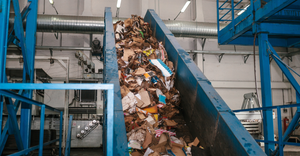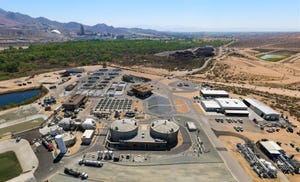Technology, IoT Continue to Inspire Smart Cities, Waste Industry Changes
The "IoT & Smart Cities: The Future is Now" session at WasteExpo will highlight the industry’s embrace of technology.
Advancements in technology, specifically mobile and the Internet of Things (IoT), have inspired big changes in the way cities across the country manage community services and maintain sustainability goals, prompting the idea of a “Smart City.” These advancements have also encouraged waste and recycling companies to continue to evolve and adapt to access to real-time data, which gives them the ability to make better business decisions and streamline processes.
“The industry is beginning to realize that there is a plethora of data and there’s great potential if they find the value of the data,” says Michael Winton, president of North America at AMCS Group.
This topic will be discussed at WasteExpo 2018, held April 23-26 in Las Vegas. Winton, along with Don Gambelin, head of business development for San Francisco-based Compology, will discuss the industry’s embrace of technology, allowing Smart Cities in the U.S. to manage assets and resources more efficiently.
“In the waste and recycling sector, technology and IoT are enabling zero waste goals and reductions in truck traffic by upwards of 40 percent," says Gambelin. “Data is enabling policymakers, service providers and waste generators to rethink the way they do business to exceed the industry’s demands.”
According to Winton, a connected city has a higher transparency of activity due to data sharing and helps to improve the overall experience for the residents by providing them with alerts.
“Commercial benefits to the operator [include] fewer missed bins and [the ability] to collect data to improve the overall customer experience,” he says. “[Technology also provides] a new level of safety for smart cities, allowing advanced warning or notifications of events or other activities happening on the route—alert operators, rerouting and also a heads up to the community and the residents.”
Advancements in technology are being used by waste and recycling companies to solve real industry problems.
“Higher expectations from waste generators, tighter restrictions on contaminated waste streams, driver shortages and rising equipment and operating costs are all demands on waste and recycling companies that are influencing the adoption of data-centric technology,” says Gambelin.
The availability of real-time data impacts every aspect of the industry. Whether it be sensors and devices on the trucks that communicate to the back office and ultimately the end customer or sensors on the equipment alerting the operations of the need for service, real-time data can affect the entire cycle of collection.
“As the ease in which data can flow from various systems continues to evolve, I think the industry is really starting to recognize the return on investment,” says Winton. “Additional hardware, sensors and ‘smart’ equipment is required and can be costly upfront. However, the backend improvements to operations, customer service, billing and collections is undeniable.”
According to Gambelin, real-time data empowers waste and recycling companies to make well-informed decisions more quickly. For example, a dispatcher can handle routing for more trucks, a single truck can generate more revenue per day at lower costs and sales people can price work to maximize profits.
Technology has played a key role in significantly improving driver safety, reducing costs and streamlining the way waste and recycling companies do business. Data is available through sensors and cameras that help monitor and measure the safety standards in the industry.
“It becomes a proactive approach to vehicle safety and a management tool. In order to manage something proactively, we must be able to monitor and measure it,” says Winton. “From a safety perspective, IoT delivers that. In addition, it reduces costs as it offers the opportunity from the value of the sensor data into route optimization practices. A host of sensor data, activity data and a route optimization algorithm leads to a direct reduction in operating costs.”
Internet-connected sensors empower waste and recycling companies by collecting large amounts of data, analyzing it and presenting actionable recommendations, says Gambelin.
“On the road, IoT allows drivers to focus on driving safely rather than navigation, data collection and recording and other distracting tasks,” he says. “In the office, IoT helps inform operations and routing decisions while reducing labor-intensive, repetitive tasks such as data entry.”
Technology and IoT also have helped waste companies engage their customers by providing tools that enable increased transparency and clear communication.
“The technology itself is not cutting edge or revolutionary; often it’s been proven in many other industries first. The key development has been wrapping the technology into industry-specific tools that we’ve never had access to before,” says Gambelin.
About the Author
You May Also Like


